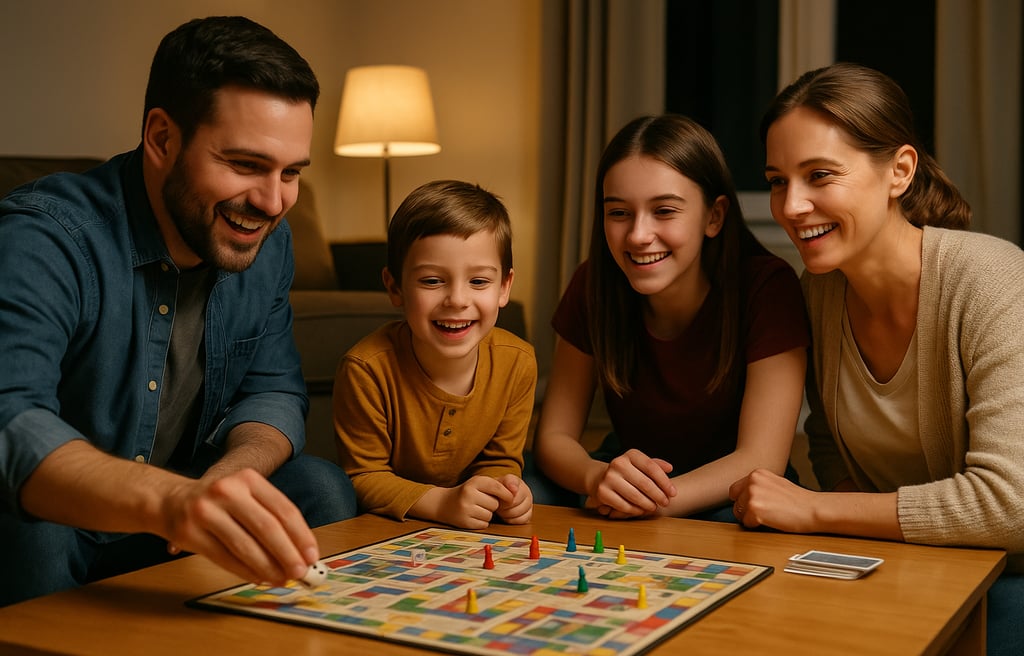Family Game Night Tips: Laugh, Connect, and Make Memories
Looking for an easy way to bring your family closer without screens or stress? Family game night is a fun, meaningful tradition that sparks laughter, builds connection, and strengthens parent-child bonds. This post is packed with practical tips, mindful parenting strategies, and example conversations to help you create a game night your kids will cherish. Whether you're rolling dice or solving puzzles, you’re building memories that last a lifetime.
BONDING ACTIVITIES
Collin Kelly
8/31/20254 min read


In our busy lives, finding simple yet meaningful ways to bond with our children can feel like a challenge. Between work emails, homework, and the lure of screens, it’s easy for families to spend evenings in separate corners of the house. But there’s a tried‑and‑true tradition that never goes out of style: family game night.
This simple ritual creates quality time, sparks laughter, and strengthens parent‑child bonding. Let’s explore practical tips, mindful parenting strategies, and example dialogues to help you make your next game night unforgettable.
Why This Activity Matters for Parent‑Child Bonding
When families gather around a board game, card deck, or even a puzzle, something special happens. You set aside distractions, sit shoulder to shoulder, and engage in a shared experience. Family activities like this are proven to boost communication skills, teamwork, and emotional connection.
Imagine this:
The game pieces are set, snacks are ready, and everyone’s phones are tucked away. Your child draws a card, laughs at a silly prompt, and before you know it, you’re all telling stories and sharing inside jokes.
This isn’t just play—it’s mindful parenting in action. It shows your child that you value their presence and that having fun together matters. Over time, these small moments build trust and create memories your child will cherish into adulthood.
Parenting tip: Rotate game choices so each family member feels included. When your child’s favorite game is on the table, they feel heard and valued.
How to Prepare and Minimize Distractions
Preparation is key to making family game night a relaxing and joyful experience. A little planning keeps the focus on fun, not frustration.
Set a consistent time. Choose one night each week or month when everyone knows game night happens—like every Friday after dinner.
Pick age‑appropriate games. Choose games your child can enjoy and succeed at. Cooperative games are wonderful for younger kids, while strategy games can challenge older ones.
Create a tech‑free zone. Have a basket or drawer for phones and tablets. Let your kids see you follow the same rule.
Prepare snacks ahead of time. Finger foods, popcorn, or fruit platters keep everyone happy without interrupting the game flow.
Set the mood. Turn on soft background music, clear the table, and light a candle. These small touches signal that this is special time together.
Mindful parenting tip: Before starting, take a moment to set intentions. Say something like, “Tonight is about having fun together—let’s enjoy every minute.”
Step‑by‑Step Ideas to Make the Most of It
Here’s a simple blueprint to turn any game night into a memory‑maker:
Kick off with excitement. Gather everyone and announce, “Game night begins now!” The enthusiasm is contagious.
Review the rules together. Make sure everyone understands how to play to avoid frustration later. Let older siblings explain rules to younger ones—it builds confidence and patience.
Celebrate teamwork and effort. Win or lose, acknowledge good sportsmanship. “I loved how you cheered for your brother when he scored points!”
Keep the atmosphere light. Choose games that fit the mood. A fast‑paced card game for laughs, a puzzle for calm collaboration, or a trivia game for fun learning.
Take breaks if needed. Some games run long. Short breaks to stretch or grab snacks keep energy positive.
Close with a tradition. End with a family cheer, a group hug, or a quick reflection: “What was your favorite part of tonight?”
These steps help ensure your quality time feels easy, intentional, and fun.
Example Dialogues to Encourage Connection
Games naturally open the door to conversation. Use these dialogue examples to spark connection:
Example 1
Parent: “I love spending this time with you. What part do you enjoy the most?”
Child: “I like when we try new things together!”
Example 2
Parent: “That was such a clever move! How did you think of it?”
Child: “I’ve been watching how you play!”
Example 3
Parent: “If you could make your own game, what would it be like?”
Child: “It would have dragons and secret treasures!”
These conversations build confidence, fuel imagination, and reinforce that your family time matters.
Prompts to Deepen the Experience
Want to turn a good game night into a great one? Try these prompts between turns or after you finish playing:
“What’s your favorite memory from our game nights so far?”
“If you could invite anyone—real or imaginary—to play with us, who would it be?”
“How can we make the next game night even more fun?”
“What’s a new game you’d like us to try together?”
Parenting tip: Write down your child’s suggestions and follow through next time. It shows them their ideas matter.
Real‑Life Story to Inspire You
One parent shared:
“We started family game nights during a rainy week, just to keep everyone busy. But they quickly became our favorite tradition. My daughter loves picking the game, and my son always makes up funny team names. We’ve had nights full of belly laughs and even some thoughtful talks about teamwork and losing gracefully. It’s amazing how much we’ve grown closer just by playing together.”
Stories like this remind us that even small routines can leave lasting impressions.
Final Thoughts and Encouragement
Family game night tips aren’t just about winning or losing—they’re about creating a space where your child feels safe, valued, and deeply connected to you. By reducing distractions, being fully present, and adding a dash of creativity, you’re practicing mindful parenting and giving your family the gift of quality time.
So, grab that deck of cards, set up the board, or pull out that puzzle. Turn off the screens, gather your loved ones, and let the laughter begin. These small moments of joy and connection are the ones your child will remember forever.
